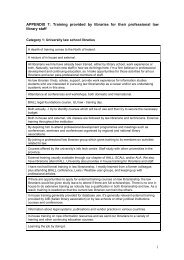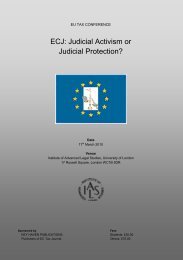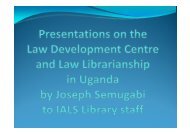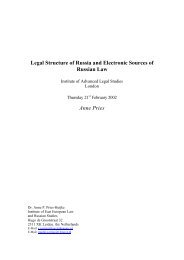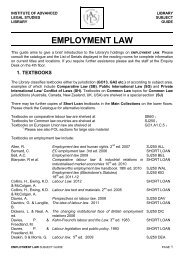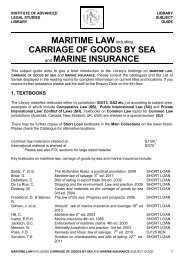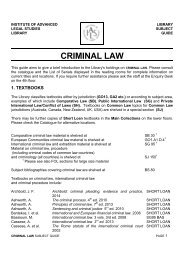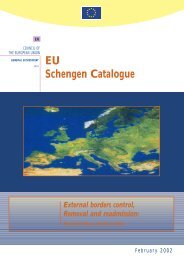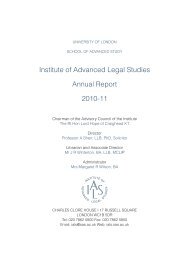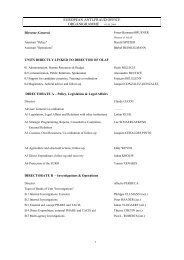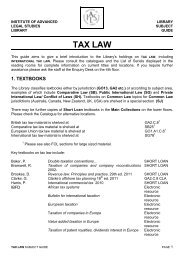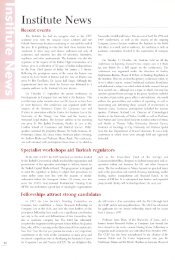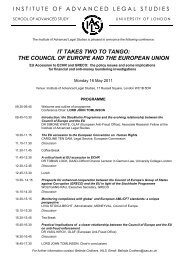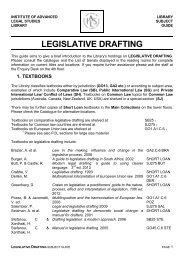a thesis - Institute of Advanced Legal Studies
a thesis - Institute of Advanced Legal Studies
a thesis - Institute of Advanced Legal Studies
You also want an ePaper? Increase the reach of your titles
YUMPU automatically turns print PDFs into web optimized ePapers that Google loves.
10 TRUSTS IN GENERAL.<br />
(4) The capacity <strong>of</strong> any one <strong>of</strong> the persons beneficially interested<br />
to enforce the obligation.<br />
These may be combined to form a definition, as follows:—<br />
" A trust is an obligation imposed either expressly or by implication<br />
<strong>of</strong> law whereby the obligor is bound to deal with<br />
property over which he has control for the benefit <strong>of</strong> certain persons<br />
<strong>of</strong> whom he may himself be one, and any one <strong>of</strong> whom may enforce<br />
the obligation."<br />
It is not straining language to speak <strong>of</strong> a person imposing an<br />
obligation on himself, while it is submitted that the use <strong>of</strong> the<br />
words " any one <strong>of</strong> whom may enforce the obligation " sufficiently<br />
marks the distinction between trust and contract; even if the<br />
definition is still wide enough to include a depositum bailment,<br />
such as that in In re Tidd (1893, 3 Ch. 154), it is submitted that<br />
that particular kind <strong>of</strong> bailment is really a trust and that it is<br />
therefore unobjectionable to call it one. On the other hand, it may<br />
perhaps be objected that it is not wide enough to cover trusts in<br />
which there is no cestui que trust, like a trust for the erection <strong>of</strong> a<br />
monument, such as that in Mitford v. Reynolds (1848, 16 Sim.<br />
105), or for the care <strong>of</strong> animals, as in In re Dean (1889, 41 Ch. D.<br />
552) ; it is true that these have been decided to be valid trusts,<br />
although they are not enforceable by anybody. In conflict with<br />
this decision, however, it has been said to be elementary law that<br />
for the creation <strong>of</strong> a trust there are three requisites—a trustee, a<br />
cestui que trust, and property which one man holds on trust for<br />
another: In re Brooke andFremlirfs Contract (1898,1 Ch. at p. 651).<br />
Such trusts are therefore not trusts in the ordinary sense in which<br />
the term is used by lawyers. The trust so called is only valid in<br />
this sense—that the person who would take if it were not carried<br />
out cannot complain if the trustee does what the settlor has<br />
requested. (Cf. Ashburner, Equity, p. 124.) They may perhaps<br />
be called trusts <strong>of</strong> imperfect obligation.<br />
There remains one other distinction. A trust may be either<br />
an active trust or a bare trust. The terms special trust and simple<br />
trust are synonymous and are sometimes used, but the former are<br />
preferable, as they have been adopted by the legislature. The<br />
distinction is <strong>of</strong> " general practical importance," to adopt the<br />
words <strong>of</strong> Hall, V.-C., in Christie v. Ovington (1875, 1 Ch. D. 279),



